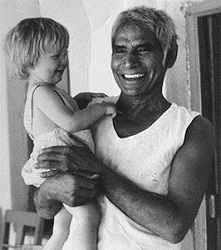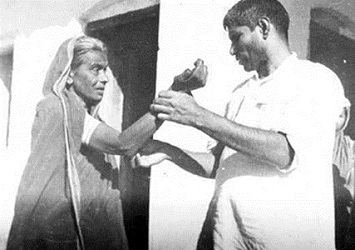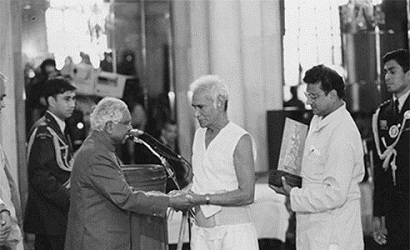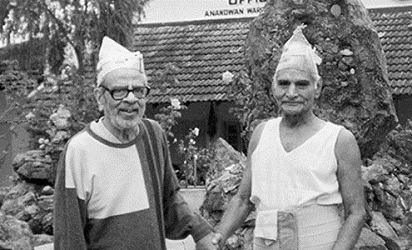Baba Amte - The Journey

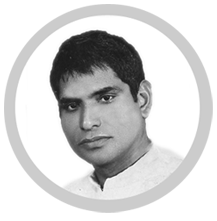
Murlidhar Devidas Amte popularly known as Baba Amte was born to an affluent Hindu Brahmin family on the 26th of December 1914 in Hinganghat, Wardha.
As a young boy, he enjoyed all the privileges that came with his family’s wealth. However, at a very young age he became aware of the plight of the poor and the marginalised and often felt that he should do something to end this injustice.
Once, during Diwali he encountered a blind beggar and emptied his pocket full of coins into his begging bowl. The beggar, feeling the weight thought as though he was being made a fool of and exclaimed “I am only a beggar young sir, don’t put stones in my bowl”, to which the boy responded “They’re coins, not stones. Count them if you wish.”
This incident left a deep, lasting impact on the boy. The idea that such misery could exist so close to his perfect world hit him hard. He regularly played witht the servants’ children despite his father’s disapproval. The rigidity that existed in his father’s world didn’t appeal to him at all. He didn’t understand why people manufactured so many ways to divide themselves.
He wished to become a doctor but was forced to become a lawyer by his father. He wanted his son to handle the family estate. For a while, Baba took to the life of an idyllic, wealthy young man very well. He spent his days horse riding, hunting and playing games of bridge and tennis at the local club. His car was decorated with the fur of the leopard he had shot. He was living an enviable life of the rich and privileged that only the fortunate get a chance to live.

But underneath this extravagance, he was restless. He felt as though he must serve a bigger purpose in the world. He began to help and volunteer wherever possible and also became involved with the freedom struggle. He was deeply influenced by greats like Tagore, Gandhi and Sane Guruji. He also started working as a waste carrier to experience the hardships they experienced. During this time, he encountered a sight that would change his life forever -
" A man in the last stage of leprosy. A rotting mass of human flesh with two holes in place of a nose, without traces of fingers or toes, with worms and sores where there should have been eyes. Literally a living corpse."
He ran away, terrified of the infection and of the sight he had seen. He had always thought of himself as being fearless and daring. The encounter with Tulshiram (the leprosy afflicted man) shattered his self-image. Even as he cared for the dying man this fear would not leave him.
I sought my soul, but
my soul I could not
see, I sought my god,
but my god eluded
me; And then I
sought my sisters
and my brothers,
and
in them I found all
three.
"I had never been frightened of anything. Because I fought British tommies to save the honour of an Indian lady, Gandhiji called me 'Abhay Sadhak', fearless seeker of the truth. When the sweepers of Warora challenged me to clean the gutters, I did so; but the same person quivered in fright when he saw the living corpse of Tulshiram."
For the next 6 months he lived in the unrelenting agony of this crisis. He was certain "where there is fear, there is no love, and where there is no love, there is no God." There seemed only one way of overcoming this problem. He must live and work with the leprosy afflicted.
Baba Amte decided to take up the cause of serving leprosy patients for the very reason that he felt disgusted to be a part of a society that was so dispassionate towards the plight of such downtrodden human beings. He regarded this apathy as 'Mental Leprosy' by aptly quoting that the most frightening disease is not losing one’s limbs, but losing one’s strength to feel kindness and compassion for other human beings.
I don't want to be a
leader. I want to be
one who goes
around with a little
oil can and offer help
when I see a break-
down.

Maharogi Sewa Samiti, Warora
(Leprosy Service Society)
Maharogi Sewa Samiti, Warora (Leprosy Service Society) was established with the intention of treating leprosy patients and for society afflicted by mental leprosy.Baba chose to call this paradise 'Anandwan', meaning 'Forest of Bliss'.
Baba Amte knew that simply curing the disease wasn’t enough. It was important to create a self-sufficient, productive society made of these social outcasts. Starting with agriculture and expanding to various small and medium scale industries right from textiles to wood work, MSS, Warora has grown into the productive haven of Baba's dreams.
Established in 1949 with Rs.14, 6 leprosy patients and a lame cow, MSS, Warora has spread its work all over Maharashtra and many organizations have taken inspiration from Baba’s work and are working for the downtrodden across the country and even the entire world. The impact Baba Amte had across the world is immeasurable and a soul like his is a rare gem the world was lucky to have.


